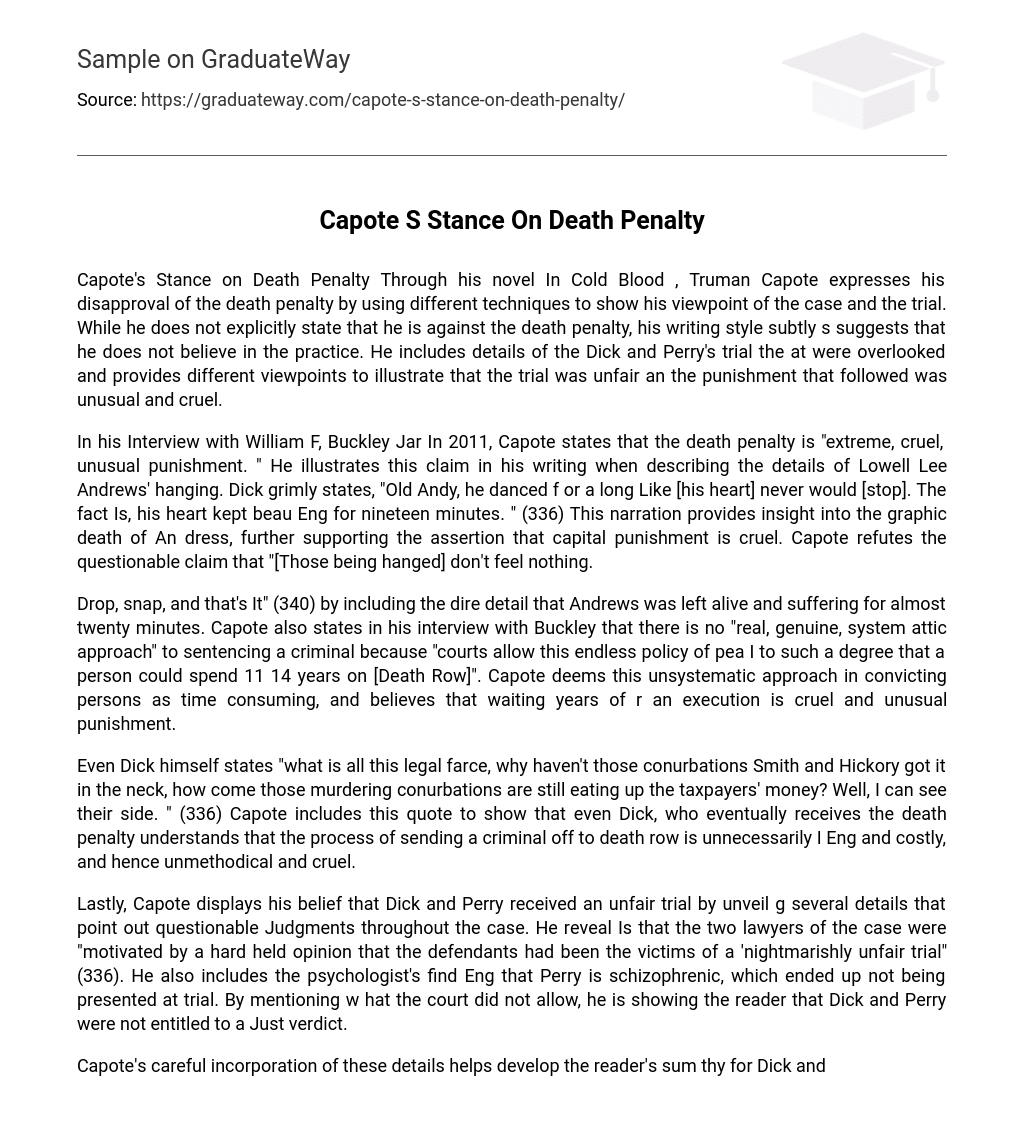Capote’s Stance on Death Penalty Through his novel In Cold Blood , Truman Capote expresses his disapproval of the death penalty by using different techniques to show his viewpoint of the case and the trial. While he does not explicitly state that he is against the death penalty, his writing style subtly s suggests that he does not believe in the practice. He includes details of the Dick and Perry’s trial the at were overlooked and provides different viewpoints to illustrate that the trial was unfair an the punishment that followed was unusual and cruel.
In his Interview with William F, Buckley Jar In 2011, Capote states that the death penalty is “extreme, cruel, unusual punishment. ” He illustrates this claim in his writing when describing the details of Lowell Lee Andrews’ hanging. Dick grimly states, “Old Andy, he danced f or a long Like [his heart] never would [stop]. The fact Is, his heart kept beau Eng for nineteen minutes. ” (336) This narration provides insight into the graphic death of An dress, further supporting the assertion that capital punishment is cruel. Capote refutes the questionable claim that “[Those being hanged] don’t feel nothing.
Drop, snap, and that’s It” (340) by including the dire detail that Andrews was left alive and suffering for almost twenty minutes. Capote also states in his interview with Buckley that there is no “real, genuine, system attic approach” to sentencing a criminal because “courts allow this endless policy of pea I to such a degree that a person could spend 11 14 years on [Death Row]”. Capote deems this unsystematic approach in convicting persons as time consuming, and believes that waiting years of r an execution is cruel and unusual punishment.
Even Dick himself states “what is all this legal farce, why haven’t those conurbations Smith and Hickory got it in the neck, how come those murdering conurbations are still eating up the taxpayers’ money? Well, I can see their side. ” (336) Capote includes this quote to show that even Dick, who eventually receives the death penalty understands that the process of sending a criminal off to death row is unnecessarily I Eng and costly, and hence unmethodical and cruel.
Lastly, Capote displays his belief that Dick and Perry received an unfair trial by unveil g several details that point out questionable Judgments throughout the case. He reveal Is that the two lawyers of the case were “motivated by a hard held opinion that the defendants had been the victims of a ‘nightmarishly unfair trial” (336). He also includes the psychologist’s find Eng that Perry is schizophrenic, which ended up not being presented at trial. By mentioning w hat the court did not allow, he is showing the reader that Dick and Perry were not entitled to a Just verdict.
Capote’s careful incorporation of these details helps develop the reader’s sum thy for Dick and Perry throughout the trial, and draws the reader into thinking that as much I information as possible should be made available to the Jury before condemning the accused to d death. Legalization of the death penalty should serve as deterrent, but if it does not serve the at very purpose, Capote states, then it is a cruel method of ridding criminals from society Y. In Cold Blood is told in a way that suggests Capote’s anti death penalty stance. Through his choice of details and narration, Capote skillfully expresses that he is against the issue.





